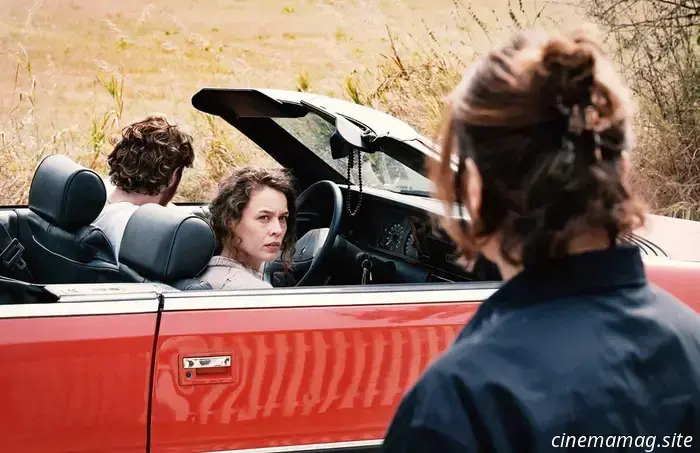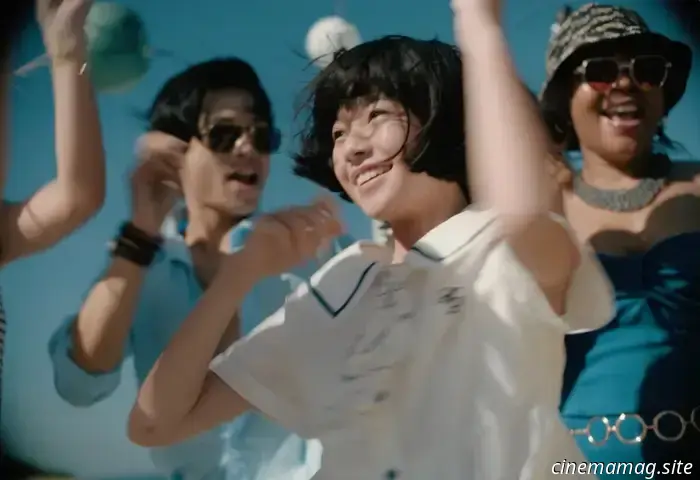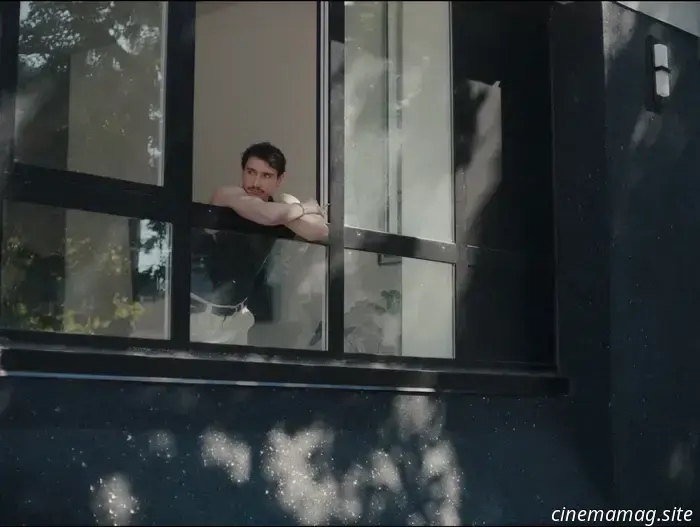
Cannes Review: Christian Petzold’s Mirrors No. 3 is a Mysterious Drama About Release and Acceptance
Christian Petzold’s fifteenth feature, Mirrors No. 3, marks his fourth collaboration with actress Paula Beer, whom he first directed in 2018's Transit. This film shares significant themes with his latest work, notably the idea of total strangers inexplicably recognizing each other and forming an immediate, deep bond without any spoken words. As such, Mirrors No. 3, like its predecessors, remains an enigma.
The film begins with Laura (Beer) gazing wistfully over a small rural bridge at the flowing river below, seemingly wishing for tragedy to befall her. She approaches the water's edge, where a figure in an all-black zentai suit slowly stand-up paddleboards by her. Their eyes meet as he glides past, accompanied by the gentle sound of water. Eventually, her boyfriend pulls her away to return to the car as they are on a road trip.
Suddenly, we find ourselves speeding down the road in a convertible with Laura, her boyfriend, and two insufferable strangers, who will only occupy a few minutes of screen time. They pass by Betty (Barbara Auer), a woman painting her fence. Petzold briefly pauses the action during the fleeting moment when Betty and Laura lock eyes, hinting at the mysterious connection central to the narrative.
The title, Mirrors No. 3, is derived from the third movement of French composer Maurice Ravel's five-part piano suite, which Laura plays in the film's final act. This is a callback to Petzold’s previous film, Phoenix, which concludes with a similarly chilling musical moment. The connection to mirrors as a motif is apparent, but the reason for its seemingly minor significance and how it reflects the film's themes remains obscured within Petzold's complex thematic framework, masked by the film’s straightforward story and approach.
The four characters arrive at a marina to board a boat, but Laura withdraws into depression, much to her boyfriend’s dismay. On the way to drop her off at the nearest train station, they nearly collide with Betty. With that crisis avoided, they drive off, only to crash the car shortly afterward. Laura’s boyfriend dies, yet she emerges from the accident with barely a scratch—a mystery among many that linger beneath the film's surface, intended to pique curiosity while also being left unresolved.
This is characteristic of Petzold’s storytelling: small mysteries that enhance, complicate, and ultimately elude resolution. While they may appear to be gaps in the plot, Petzold’s distinctive pacing, mood, and tone transform these enigmas into the essence of his filmography—elements that make his films memorable and interconnected. Therefore, it’s no surprise that Mirrors No. 3 is deeply rooted in this concept. Gradually, the theme of letting go becomes central to the narrative.
Unbeknownst to her, Laura desires recovery at Betty’s countryside home, where Betty warmly invites her, offering continuous care even though Laura seems to need it little. Laura is a piano student in Berlin, a classically trained musician proficient in playing impressionist pieces and identifying musical keys with ease. Betty’s purpose is not as clear; she is a single woman managing her household but takes on a motherly role, caring for Laura after the accident, reading her Tom Sawyer stories at bedtime, and warmly welcoming her to stay post-recovery.
However, Betty's house lacks vibrancy beyond the freshly painted fence, which symbolically hints at Laura’s impact on her life. Betty's once-thriving herb garden is dying, her demeanor is shy, and her growing attachment to Laura feels somewhat desperate. Yet, under Betty's care, the trauma of Laura's accident and her boyfriend’s death seems to dissolve, as if it never occurred. It appears to be exactly what Laura wants.
This overview only encapsulates the first ten minutes or so, but due to its sprawling mysteries, Mirrors No. 3 is best experienced with minimal context. While it may not rank among Petzold’s finest, films like Barbara and Undine set a very high standard. It exemplifies Petzold's signature style, which I intend as high praise. Don’t expect all questions to be answered; there’s no climactic revelation or narrative resolution, as Petzold tends to eschew such conventions. Nevertheless, the mysteries that do surface provide unexpected gems.
Mirrors No. 3 premiered at the 2025 Cannes Film Festival and will be distributed by Metrograph Pictures.
Other articles
 Cannes Review: Chie Hayakawa’s Renoir Presents a Slowly Unfolding and Rewarding Coming-of-Age Tale
Only three years after receiving a special mention from the Camera d’Or jury for Plan 75, Chie Hayakawa makes her return to Cannes as one of seven filmmakers making their debut in the main competition—an unconventional change of pace for a festival traditionally aligned with established names. In Plan 75, a sharp piece of speculative fiction,
Cannes Review: Chie Hayakawa’s Renoir Presents a Slowly Unfolding and Rewarding Coming-of-Age Tale
Only three years after receiving a special mention from the Camera d’Or jury for Plan 75, Chie Hayakawa makes her return to Cannes as one of seven filmmakers making their debut in the main competition—an unconventional change of pace for a festival traditionally aligned with established names. In Plan 75, a sharp piece of speculative fiction,
 Star Wars: The High Republic – Fear of the Jedi #4 - Comic Book Sneak Peek
Star Wars: The High Republic – Fear of the Jedi #4 is set to release this Wednesday, and you can view the official preview of the issue below, brought to you by Marvel Comics… KEEVE TRENNIS and her group of exhausted Jedi are confronted with their greatest challenge…and their deepest fear. The NAMELESS attack like you’ve never witnessed before […]
Star Wars: The High Republic – Fear of the Jedi #4 - Comic Book Sneak Peek
Star Wars: The High Republic – Fear of the Jedi #4 is set to release this Wednesday, and you can view the official preview of the issue below, brought to you by Marvel Comics… KEEVE TRENNIS and her group of exhausted Jedi are confronted with their greatest challenge…and their deepest fear. The NAMELESS attack like you’ve never witnessed before […]
 Cannes Review: Ari Aster’s Eddington is an ambitious period film set in the 2020s that succeeds in moments.
In Eddington, Ari Aster’s newest descent into despair, the plan to construct a data center in remote New Mexico triggers a long-awaited psychological collapse. The central figure is Sheriff Joe Cross (Joaquin Phoenix), who deals with a troubling array of issues, including an overly engaged mother-in-law (Deirdre O'Connell), and a seemingly indifferent, catatonic spouse (Emma Stone).
Cannes Review: Ari Aster’s Eddington is an ambitious period film set in the 2020s that succeeds in moments.
In Eddington, Ari Aster’s newest descent into despair, the plan to construct a data center in remote New Mexico triggers a long-awaited psychological collapse. The central figure is Sheriff Joe Cross (Joaquin Phoenix), who deals with a troubling array of issues, including an overly engaged mother-in-law (Deirdre O'Connell), and a seemingly indifferent, catatonic spouse (Emma Stone).
 Cannes Review: Drunken Noodles is an Alluring and Uniquely Soothing Drama
The laws of time and space are playfully challenged in Drunken Noodles, Lucio Castro’s highly anticipated third feature and undoubtedly the standout title in this year’s ACID lineup. Many who are familiar with the New York-based, Argentinian-born director first came across his work through End of the Century, a film that shares a similar approach to time: set in Barcelona,
Cannes Review: Drunken Noodles is an Alluring and Uniquely Soothing Drama
The laws of time and space are playfully challenged in Drunken Noodles, Lucio Castro’s highly anticipated third feature and undoubtedly the standout title in this year’s ACID lineup. Many who are familiar with the New York-based, Argentinian-born director first came across his work through End of the Century, a film that shares a similar approach to time: set in Barcelona,

 John Travolta is set to confront rogue orcas in Renny Harlin's Black Tides.
John Travolta is preparing to face a battle for survival against a group of hungry orcas. According to Deadline, the actor is collaborating with Renny Harlin, known for directing Die Hard 2 and Cliffhanger, for the project titled Black Tides. The survival thriller has been penned by Chris Sparling (Buried) and Ángel Agudo (Apocalypse Z), and will […]
John Travolta is set to confront rogue orcas in Renny Harlin's Black Tides.
John Travolta is preparing to face a battle for survival against a group of hungry orcas. According to Deadline, the actor is collaborating with Renny Harlin, known for directing Die Hard 2 and Cliffhanger, for the project titled Black Tides. The survival thriller has been penned by Chris Sparling (Buried) and Ángel Agudo (Apocalypse Z), and will […]
Cannes Review: Christian Petzold’s Mirrors No. 3 is a Mysterious Drama About Release and Acceptance
Christian Petzold’s fifteenth feature, Mirrors No. 3, is his fourth collaboration with Paula Beer, the actress who first appeared under his direction in Transit (2018). This film also explores key themes similar to those in his latest work, particularly the concept of complete strangers intuitively recognizing one another and experiencing an instant, profound connection without saying a single word. It goes without saying that Mirrors No. 3...
